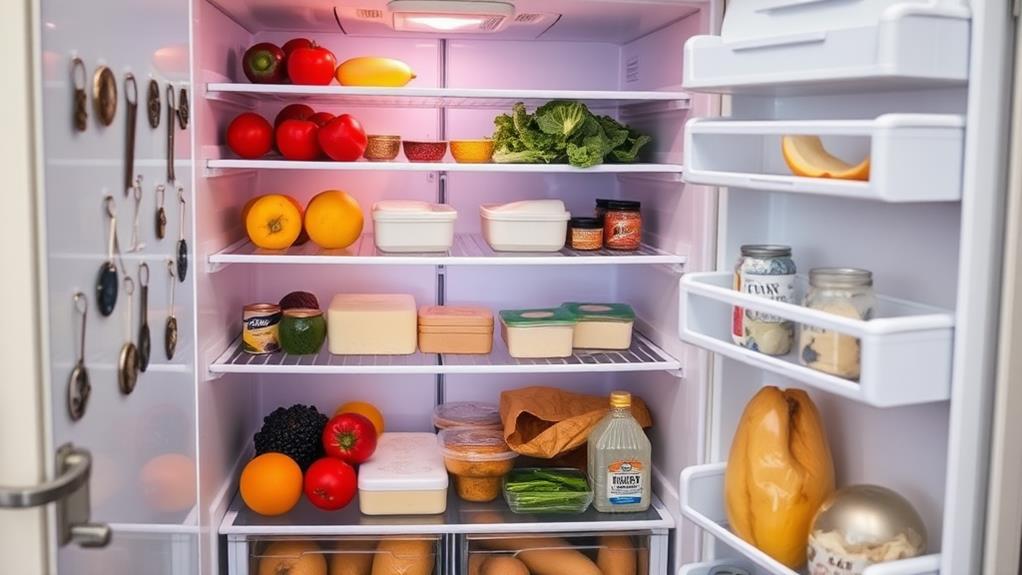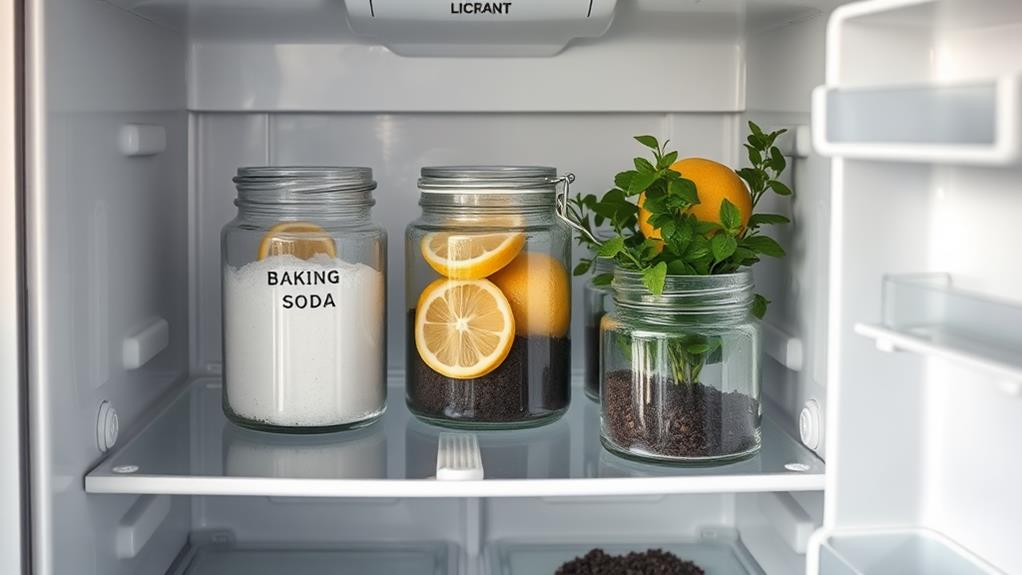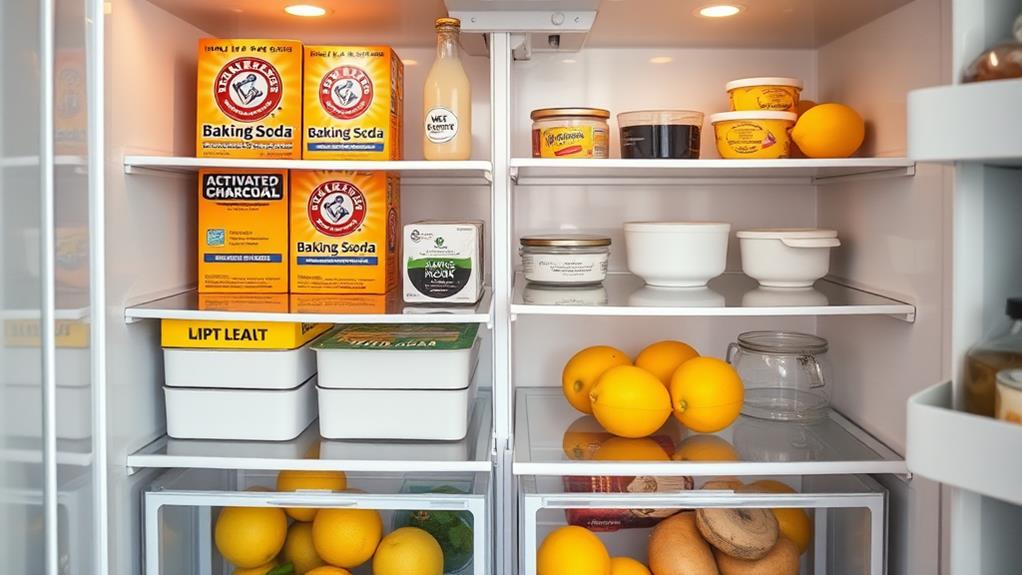How to Get Bad Smell Out of Fridge
To eliminate bad smells from your fridge, start by identifying the source. Remove all items, discarding expired products, and clean thoroughly with a baking soda solution. Use natural deodorizers like open containers of baking soda, activated charcoal, or lemon slices to absorb odors. Implement preventative measures by maintaining proper temperature (37-41°F), using airtight containers, and cleaning spills promptly. For long-term freshness, organize your fridge using the FIFO method, check for expired items weekly, and deep clean every 3-4 months. These steps will help neutralize existing odors and prevent future ones from developing. Discover more strategies to keep your refrigerator smelling fresh and clean.
This post may contain affiliate links. If you make a purchase through these links, I may earn a commission at no additional cost to you. Additionally, portions of this post may be generated using artificial intelligence (AI) technology. While we strive for accuracy, please be aware that AI-generated content may not always be perfect and should be fact-checked when necessary.
The Spatula Scoops
- Remove all food items and clean interior surfaces with a baking soda solution to neutralize odors.
- Place an open container of baking soda or activated charcoal in the fridge to absorb persistent smells.
- Use natural deodorizers like lemon slices, vinegar solution, or coffee grounds to combat stubborn odors.
- Clean the drip pan and check for mold or residue buildup that may contribute to bad smells.
- Maintain proper temperature and regularly remove expired foods to prevent future odor issues.
Identify Odor Sources

Before tackling any unpleasant odors in your fridge, it is vital to pinpoint their origins. Start by thoroughly inspecting food items for signs of spoilage. Expired food is often the primary culprit behind those nasty smells. Don't forget to check for food spills on shelves and in drawers, as these can foster bacterial growth and contribute to odor problems.
Next, examine your airtight containers. Older ones may retain odors or develop leaks, leading to further contamination. It is important to replace these regularly to maintain a fresh-smelling fridge. Another often-overlooked odor source is the drip pan. Inspect it for mold or residue buildup, which can become a significant source of foul smells if not cleaned regularly.
Lastly, check the condition of your refrigerator door gaskets. Damaged seals can allow air leaks that compromise odor control. By systematically identifying these odor sources, you'll be better equipped to clean the fridge effectively. Remember, a thorough inspection is the first step in eliminating unpleasant odors and maintaining a fresh, hygienic refrigerator environment.
Clean and Sanitize Thoroughly
Thorough cleaning is the cornerstone of eliminating fridge odors. Begin by unplugging your refrigerator and removing all food items. Discard any expired or spoiled products, as they're often the primary culprits of unpleasant smells. Next, focus on cleaning all removable parts. Take out shelves and drawers, then soak them in warm water mixed with dish soap. This will guarantee a thorough sanitization process.
For the interior surfaces, including walls and the door gasket, use a baking soda solution. Mix one tablespoon of baking soda with a quart of warm water, and wipe down these areas to neutralize lingering odors. Don't forget the drip pan, which can harbor mold and residue. Clean it thoroughly with warm, soapy water.
After you've cleaned all components, it's vital to air out your fridge. Leave the door open for several hours to allow any remaining odors to dissipate. This step is essential before you reload your fridge with food. By following these steps meticulously, you'll effectively clean and sanitize your refrigerator, eliminating bad smells and creating a fresh, hygienic environment for your food storage.
Natural Deodorizing Methods

Why rely on harsh chemicals when nature offers effective solutions for fridge odors? You can use several natural deodorizers to absorb and eliminate smells effectively. Baking soda, a versatile odor absorber, can be placed in an open container inside your fridge. For best results, replace it every three months. Activated charcoal is another powerful option; simply leave it uncovered in your fridge to neutralize strong smells.
Fresh lemon juice or slices not only provide a pleasant scent but also have natural antibacterial properties. For stubborn odors, try wiping down surfaces with a vinegar and water solution. Uncooked oats or coffee grounds in a bowl can also help absorb unwanted smells, with oats needing replacement after a few days.
Here are five key benefits of using natural deodorizing methods:
- Environmentally friendly
- Cost-effective
- Safe for food storage areas
- No harsh chemical residues
- Customizable scent options
Preventative Maintenance Tips
Keeping your fridge smelling fresh doesn't have to be a reactive process. By implementing preventative maintenance tips, you can avoid unpleasant odors before they start. First, make it a habit to regularly replace your refrigerator's air filters every six months. This simple task helps maintain top-notch air quality and prevents odors from accumulating.
Deep clean your fridge every 3-4 months, making sure you promptly clean up food spills and discard expired items. This routine cleaning minimizes odor buildup and keeps your refrigerator hygienic. Maintain a consistent temperature between 37-41 degrees Fahrenheit to inhibit bacteria growth that can lead to unpleasant smells.
Use airtight containers for food storage to keep odors contained and organize your fridge to allow proper airflow. This prevents smell transfer between items and helps maintain freshness. Implement a "first-in, first-out" (FIFO) system to make certain you use older items before they spoil, reducing the risk of developing bad odors.
Long-Term Freshness Strategies

A fridge's long-term freshness relies on consistent, proactive habits. To keep your refrigerator smelling clean and your food fresh, implement these strategies. First, regularly check and remove expired or spoiled food at least once a week. This prevents odor buildup and contamination. Next, organize your fridge using the First In, First Out (FIFO) method, ensuring older items are consumed before they spoil. Use airtight containers for leftovers and open foods to minimize odor spread and keep them fresh longer.
Maintain your fridge's temperature between 37-41°F (3-5°C) to slow bacteria growth, which can cause bad smells. Schedule deep cleaning every 3-4 months, including wiping down surfaces with a baking soda solution to remove odors effectively. These practices will help deodorize your refrigerator and maintain long-term freshness.
To further enhance your fridge's freshness:
- Install an air filter to absorb odors
- Place an open box of baking soda to neutralize smells
- Clean spills immediately to prevent odor-causing bacteria
- Use herb sachets or citrus peels as natural deodorizers
- Thoroughly clean removable parts like shelves and drawers regularly
Frequently Asked Questions
What Kills a Bad Smell in the Fridge?
To kill bad smells in your fridge, you've got several effective options. Use baking soda in an open container or sprinkled on shelves to absorb odors. Alternatively, try activated charcoal in an uncovered container for strong smells. Clean regularly with a vinegar solution to eliminate bacteria and persistent odors. Keep your fridge organized with tightly sealed food to prevent smells from spreading. Don't forget to replace air and water filters as recommended by the manufacturer to reduce odors from stale air and contaminated water.
How Long Does It Take to Get Smell Out of Fridge?
It typically takes several days to fully eliminate odors from your fridge. You'll see immediate improvement within 24 hours using baking soda, but complete elimination can take 3-5 days. For stronger smells, leave the door open for a day to increase air circulation. Natural deodorizers like activated charcoal or vinegar need a few days to work effectively. In stubborn cases, a thorough cleaning followed by 1-2 days of airing out can greatly reduce persistent odors. Patience is key in this process.
Why Does My Fridge Smell Bad but No Rotten Food?
Your fridge might smell bad without rotten food due to several reasons. You've likely got accumulated spills or residues harboring bacteria and mold. Unsealed food can release odors that permeate the fridge. Check your drip pan for moisture and organic material buildup, which can cause mold growth. Don't forget about dirty air or water filters; they need regular replacement. Finally, the fridge's insulation material can absorb strong odors, making them difficult to eliminate even after cleaning.
How to Get Rotten Meat Smell Out of the Fridge?
To eliminate rotten meat odor from your fridge, start by removing the source and sealing it in a plastic bag for disposal. Clean affected areas thoroughly with a warm water and baking soda mixture, which neutralizes odors. Place an open box of baking soda or activated charcoal inside to absorb lingering smells. Wipe surfaces with a vinegar solution to break down odor-causing bacteria. Finally, ventilate your fridge by leaving the door open for a few hours, allowing fresh air to circulate and disperse any remaining odors.





